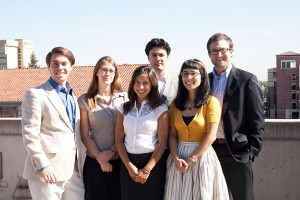Students selected for USC’s first human rights clinic
The first six students to take part in the Gould School of Law’s new international human rights clinic were announced last week.
Professor Hannah Garry will lead the clinic, the first of its kind at USC, to guide the students as they work with judges and legal officers on human rights prosecutions in Rwanda and Cambodia.
Garry, who worked previously at the University of Colorado School of Law with students on cases involving Guantanamo prisoners, said the clinic will give students hands-on experience in law.
“[The purpose is] to give students the opportunity to work on real-life cases and projects that teach them how to be human rights advocates … and international lawyers,” Garry said.

Real justice - Six third-year law students were chosen to work with the human rights clinic at the Gould School of Law. - Dan Doperalski | Daily Trojan
Joining her are third-year law students Trevar Kolodny, Jamie Hoffman, Aysha Pamukcu, Shannon Raj, Brian Rifkin and Seepan Parseghian.
“I’ve been hoping USC would have a program like this for a long time,” Raj said.
The first semester, the clinic will accept only six law students who will work in the spring. In subsequent terms, it will accept eight students who will be expected to commit to a year of work in the clinic.
In the first semester, students will be working long-distance with judges and legal officers from the Rwanda tribunal in Arusha, Tanzania.
“They will be working remotely with a lot of these organizations overseas that we’re partners with and using all of the technological tools that we have in our day to be able to cross the borders — like Skype, conference calls, video conferencing,” Garry said.
The melding of international law with human rights advocacy was a key factor in attracting students.
“I felt like my classes were very interesting, but they didn’t always speak to each other,” Pamukcu said. “That interdisciplinary aspect that I was really hungry for had finally presented itself in the form of the clinic.”
Pamukcu’s interest in human rights law was born in high school, as a reporter. Writing about issues such as teen relationship abuse, she said she felt a desire to go beyond just writing about them.
“I realized I was getting frustrated just reading about it and that I wanted to actually be involved and helping out,” she said.
Parseghian said he was exposed to the horrific effects of human rights abuses from a very young age. His grandparents from both sides were survivors of widespread killings in Armenia and eventually settled in Iraq, where his parents were born.
“I was very familiar at a very early age about what the greatest forms of human rights abuses could be and what human beings are very capable of doing to one another,” Parseghian said.
Though the clinic is open only to law students — with priority being given to second- and third-year students — Garry sees the clinic assuming a broader role on campus.
“I do perceive the clinic … providing a focal point for a real innovative kind of thinking about human rights problems of our day and how to come up with good solutions for tackling them,” she said.
Garry said she hopes the clinic will allow students to work on cases and projects concerning persecution, torture, human trafficking, genocide and other crimes against humanity.
Part of the challenge, Garry said, is picking and choosing which cases to work on.
“I have been networking with partner organizations overseas and also here in L.A.,” she said. “I really want for the clinic to focus on local human rights issues as well. There’s just so much to get involved with.”
Garry said she hopes that the program will eventually evolve to allow students to travel abroad to places such as Arusha and work hand-in-hand with judges in the second semester of their service at the clinic.
“What I’m working on developing right now is a kind of partner support fund that would allow our students and myself to go onsite as partners, to go overseas after working long-distance remotely,” she said.
